Pest control in an apartment should generally be done every two to three months. This frequency helps manage common pests and prevents infestations. However, the exact need can vary based on specific conditions of the apartment, like pest activity levels and building age. So, how often should pest control be done in an apartment? Read on to understand more about setting an optimal pest control schedule for your living space.
Key Takeaways
- Regular pest control is essential in apartments to prevent health risks, property damage, and tenant dissatisfaction, with treatments ideally scheduled every two to three months.
- Frequency of pest control visits should be tailored to building age, climate, and specific pest activity, with monthly treatments recommended for serious infestations.
- Seasonal changes impact pest activity; proactive management, including resident cooperation and proper preventive measures, enhances overall pest control effectiveness.
Understanding the Importance of Regular Pest Control
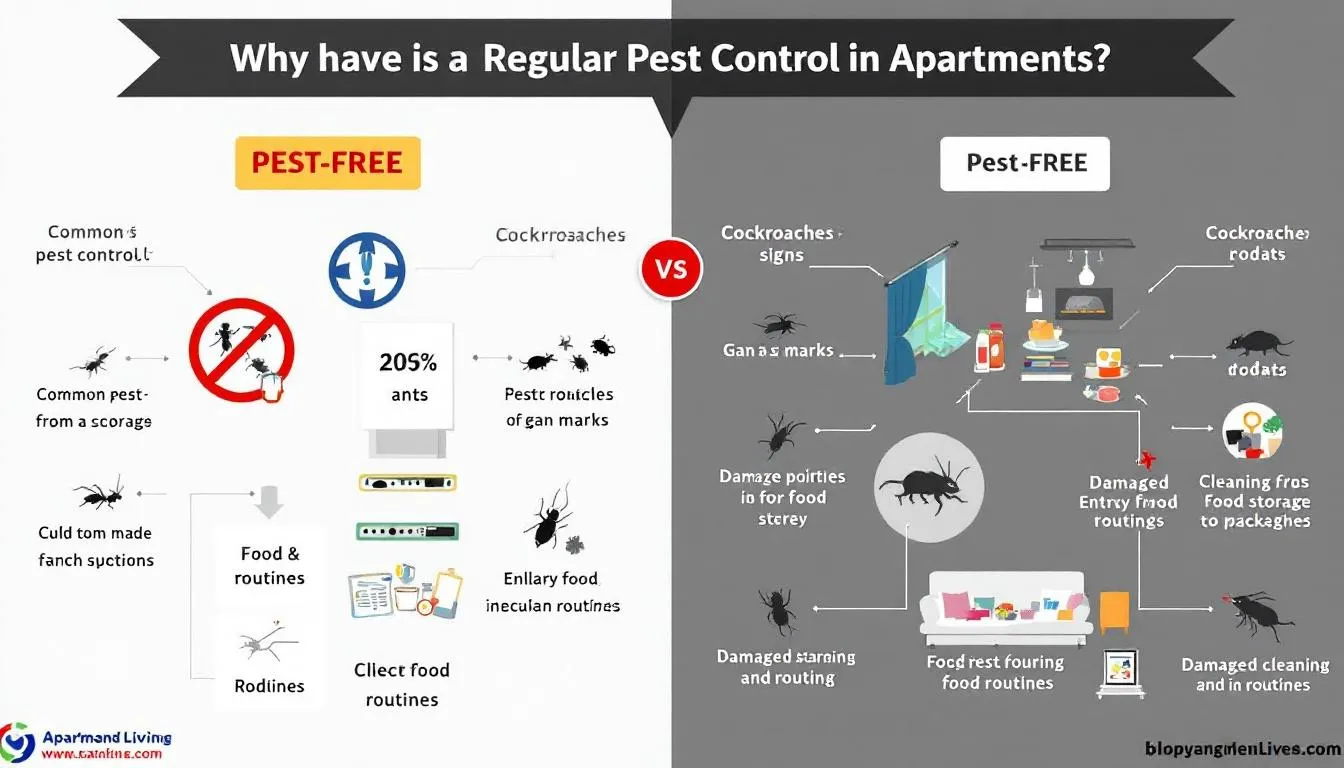
Apartments in an apartment building are particularly prone to pest infestations due to the close proximity of residents, which makes regular pest control crucial. Neglecting pest control can lead to significant health risks and complaints from tenants, which can affect the overall value of the property and tenant satisfaction. Proper pest control preserves property value by preventing damage and keeping tenants satisfied.
Frequent regular inspections prevent pests from gaining a foothold, especially in multi-unit buildings. Inspections identify possible pest harboring sites and conditions leading to infestations, allowing for prompt action. This proactive approach helps to mitigate risks, preserve the integrity of the home, and ensure the health and safety of all residents.
Regular pest control treatments maintain a pest-free environment, crucial for resident satisfaction in apartments. This approach ensures treatments last and prevents infestations, keeping tenants comfortable and happy. Consistent pest management avoids complaints and keeps apartments in high demand.
In summary, regular pest control addresses current issues, prevents future infestations, and ensures a healthy living environment for all residents.
Determining the Optimal Frequency for Pest Control Visits
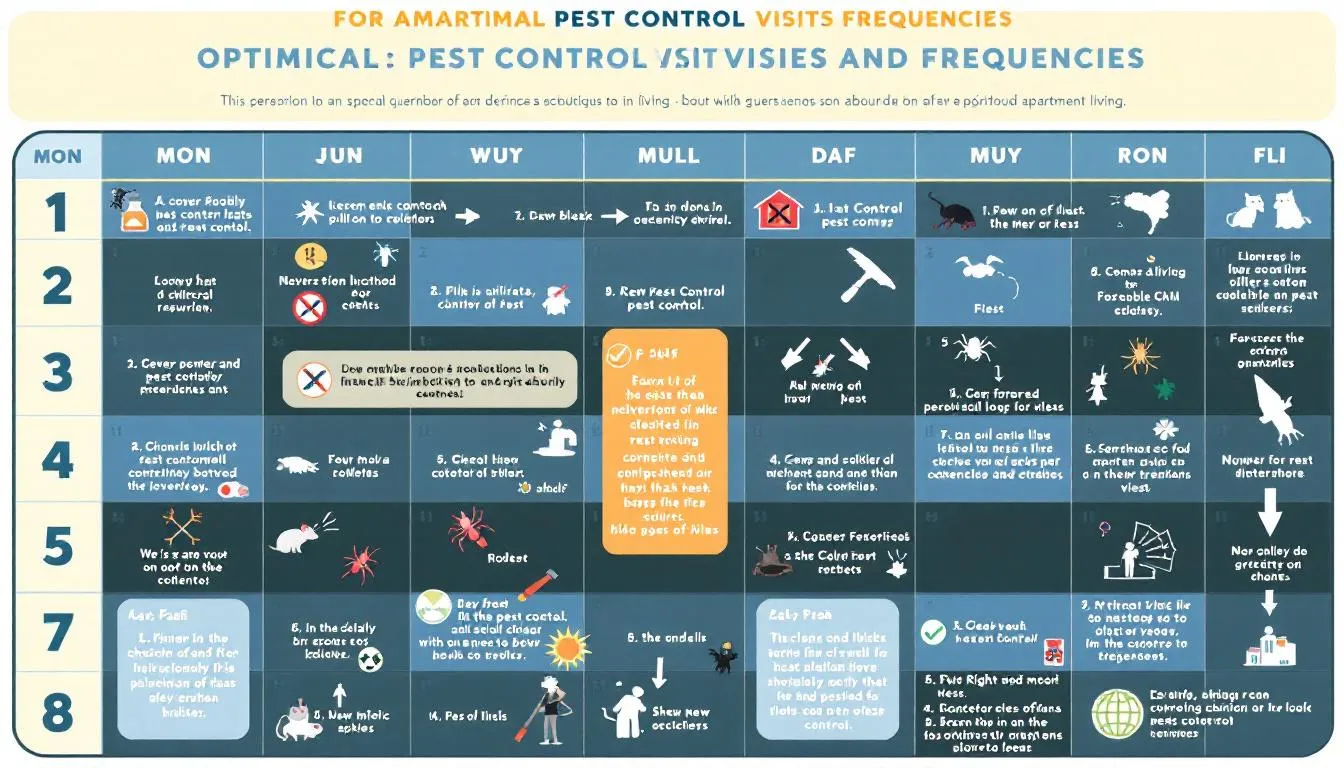
The frequency of pest control in an apartment depends on factors like pest activity level, building needs, and seasonal patterns. Generally, pest control visits should be scheduled every two to three months, with more frequent treatments for serious pest cases. The aim is to develop a schedule that addresses specific risks and often should pest control to prevent major infestations.
Location, climate, and building age are several factors that significantly influence the frequency of pest control visits. Older buildings tend to have more pest issues due to worn seals and cracks, making pest control more crucial.
Also, consider the pest activity level and specific building needs when determining treatment frequency. By understanding these factors, property managers can ensure maximum effectiveness of pest control services and provide a safe, pest-free environment for residents.
Monthly Treatments
Monthly treatments are recommended for apartments with high pest activity or severe infestations to ensure effective management. For severe infestations like roaches or ants, monthly treatments should continue until the issue is controlled. Severe roach infestations initially require monthly treatments for two to three months.
Typical apartment pests include ants, cockroaches, bed bugs, termites, fleas, and pantry pests like moths. Serious ant infestations necessitate monthly pest control visits. Many pests, including termites, chew through wood, making them a significant concern for homeowners, especially in cases of pest infestation and pest problem.
Frequent treatments target and eliminate pests, preventing the spread and further damage. Prompt monthly treatments offer a long-term solution to pest problems for property managers through effective pest treatments. To ensure effectiveness, pest control be done regularly.
Bi-Monthly Treatments
Bi-monthly treatments are suggested for apartments with moderate pest activity. They:
- Are less frequent than monthly visits
- Still effectively manage pest populations
- Balance addressing current pest issues and preventing future ones
- Ensure a safe and comfortable environment through monthly treatment.
Quarterly Treatments
Quarterly pest control treatments are recommended for apartments with low pest activity. These treatments ensure continuous prevention and early detection of potential pest issues. Quarterly treatments address minor pest issues before they escalate.
Adhering to the recommended quarterly schedule ensures effective pest management. Following this schedule helps property managers maintain a pest-free environment and prevent infestations.
Quarterly treatments on a quarterly basis offer a proactive approach, providing peace of mind for residents and property managers alike, especially when considering the first treatment and professional treatments.
Seasonal Considerations for Pest Control
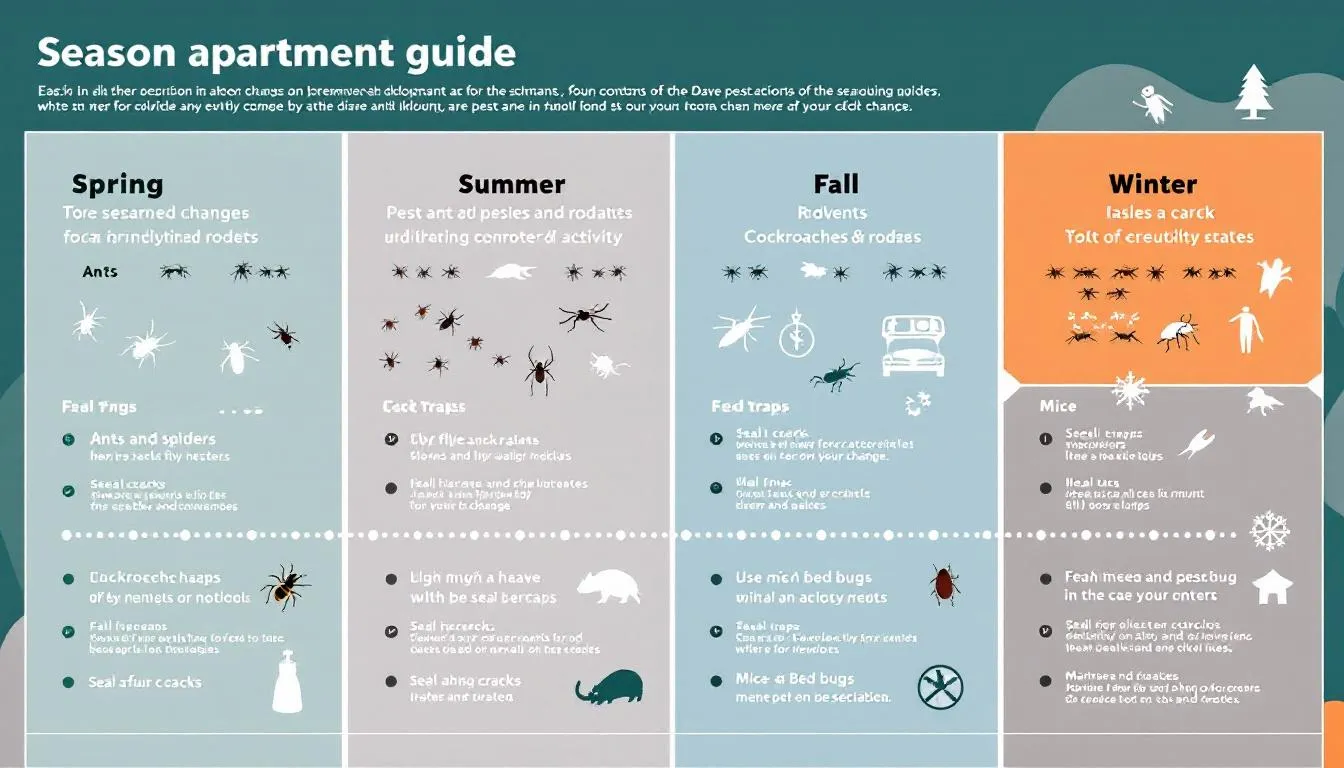
Pest activity varies throughout the year based on seasonal patterns. Recognizing how pest activity changes seasonally is crucial for effective management. Adapting pest control visits to seasonal trends can be highly effective. This approach significantly lowers the risk of major infestations. To manage recurring issues and adjust treatments as needed, consider the following:
- Conduct inspections every two to three months
- Adapt pest control visits according to seasonal trends
- Monitor and adjust treatments based on inspection findings
Each season brings unique pest challenges, so adjusting schedules accordingly helps manage fluctuations. Awareness of seasonal pest patterns allows for proactive steps to prevent infestations and maintain a pest-free environment year-round.
Spring and Summer
Spring and summer are peak pest seasons due to rising temperatures. Common pests active in spring and summer include:
- Ants
- Flies
- Termites
- Mosquitoes
- Wasps Regular pest control during these months is crucial to contain problems before they spread.
The prevalence of mosquitoes and wasps in warmer months makes regular pest management increasingly necessary. Early-season pest management prevents severe infestations and ensures a comfortable living environment.
Fall
Falling temperatures in fall drive rodents like mice and rats indoors seeking warmth and food. Managing rodents in fall is essential due to the damage and safety risks they pose.
Sealing openings and using preventive traps help keep these certain pests at bay and prevent future infestations.
Winter
In winter, pests like cockroaches invade homes seeking warmth and food. Winter pest control is crucial since pests like cockroaches pose health risks by spreading bacteria. Adjusting pest control schedules in winter mitigates issues with indoor pests during colder months.
Winter management is essential for controlling indoor pests seeking warmth. Promptly addressing these pests ensures resident well-being and a healthy living environment throughout winter.
The Role of Resident Habits in Pest Management
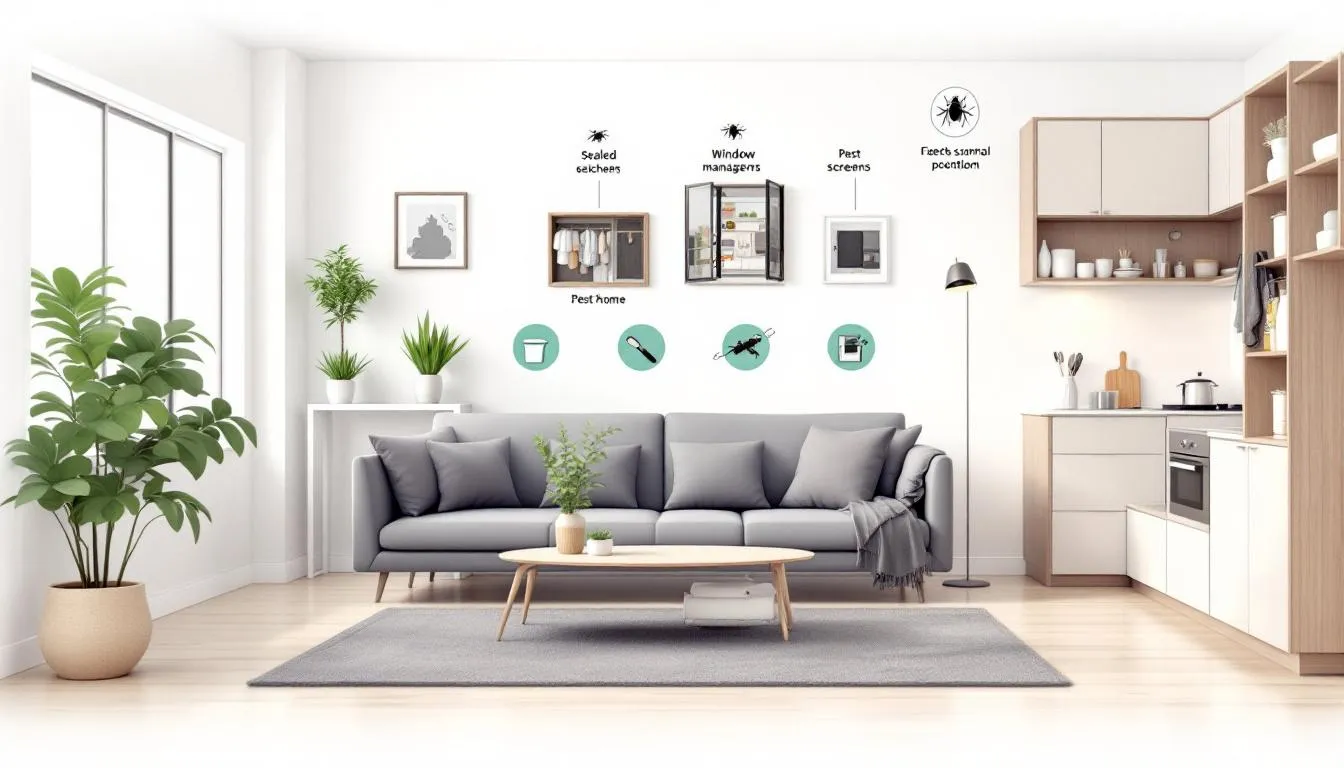
Tenants’ habits, like improper food storage and neglecting cleanliness, can significantly hinder effective pest control. Inspections are crucial to identify potential pest harboring sites and conditions leading to infestations. Resident habits impact pest control by influencing infestation likelihood.
Key factors in preventing pest infestations include:
- Keeping shared spaces clean to significantly decrease pest attraction.
- Maintaining cleanliness and proper food storage to help residents prevent infestations.
- Cooperation between residents and pest control services to ensure effective management.
Maintaining Cleanliness
Cleanliness prevents infestations by:
- Eliminating clutter that provides hiding places and food sources for pests.
- Regularly cleaning common areas to minimize pest attraction and breeding opportunities.
- Encouraging the use of sealed containers for garbage disposal to significantly reduce food sources for pests.
Sealed trash containers minimize the risk of attracting pests. Keep trash areas clean and well-located away from buildings to reduce attraction to pests like rodents and flies. Sealed trash bins help residents prevent infestations and maintain a clean environment.
Reporting Issues Promptly
Residents should report sightings immediately for timely intervention. Immediate reporting ensures quicker intervention, reducing the risk of larger infestations.
Swift action upon noticing pests prevents full-blown infestations.
Educating Residents
Educating residents on pest control helps them recognize their role in effective management. Education on proper food storage, cleanliness, and reporting sightings enhances pest management effectiveness.
Implementing Effective Preventive Measures
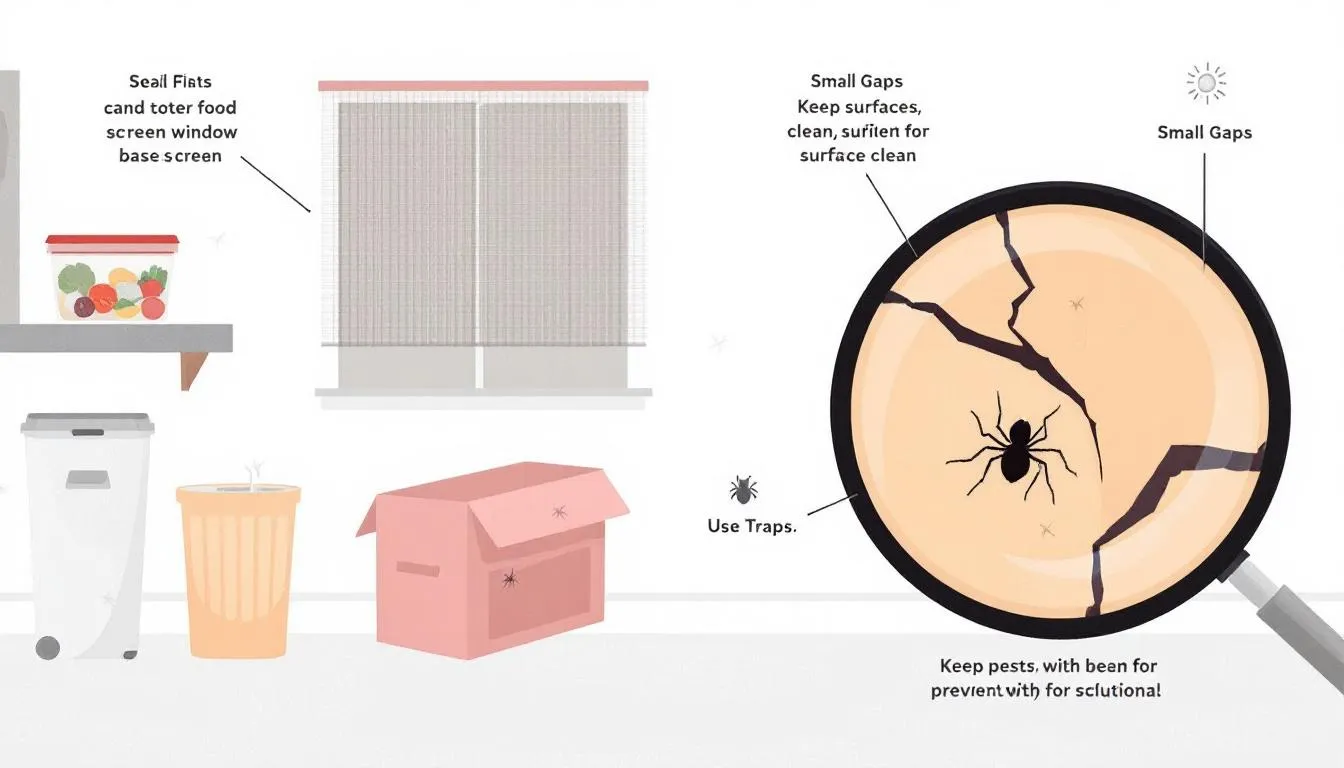
Preventive measures are crucial for keeping pests at bay and ensuring long-term treatment effectiveness. Inspecting potential entry points regularly is vital for preventing infestations. In fall, inspecting homes for entry points prevents rodent access and nesting.
Smart landscaping and diligent food storage are key strategies for pest prevention. Proper waste management eliminates potential food sources for pests.
Preventive pest control is cheaper than addressing major infestations. Ongoing preventative maintenance and exclusion sustain long-term control between visits.
Sealing Entry Points
To prevent pest entry:
- Seal cracks in walls, loose window frames, and door gaps.
- Assess and seal even the smallest openings in walls, foundations, and around utilities to block access.
- Use caulk or weather stripping to effectively close gaps that allow pest entry.
Sealing gaps around windows, doors, and pipes extends intervals between liquid pesticides applications. Addressing entry points significantly reduces infestation risk and maintains a pest-free environment.
Proper Waste Management
Proper waste management eliminates potential food sources for pests. Clean and well-maintained common areas significantly reduce pest attraction. Regular cleaning and maintenance of shared spaces deny pests food sources.
Prompt trash disposal and cleaning up spills deter pests.
Landscaping and Outdoor Maintenance
Trimming bushes and trees away from buildings reduces pest entry pathways. Regular shrub and tree trimming reduces pest access to buildings. Trimming shrubbery away from exteriors lessens pest hiding places and access points.
Maintaining outdoor areas reduces pest habitats and entry points near buildings. Consistent landscaping is essential for effective pest management. Addressing these areas prevents pests from easily accessing buildings.
Choosing the Right Pest Control Services
Choosing the right pest control service is essential for effective management. Key points to consider include:
- Landlords typically maintain a pest-free environment.
- Tenants may be liable for pest control costs if the infestation is due to their negligence.
- Partnering with a licensed pest control operator is essential for ensuring comprehensive pest management in apartments.
Engaging a reliable pest control service simplifies the treatment process and keeps property managers well-informed about pest issues. Professional pest control services offer:
- Expertise and advanced tools necessary for effective pest management.
- Custom plans designed to address specific pest issues.
- Targeted management for each apartment complex.
Evaluating Pest Control Companies
Evaluating pest control companies is crucial for ensuring effective pest management in your apartment. Key criteria to consider include:
- The provider’s expertise
- Methods used
- Safety protocols
- Customer feedback
Inquire about each provider’s expertise and methods to assess their suitability for your specific pest control needs.
Customer feedback is essential in evaluating pest control services, as it reflects the experiences of other residents with the companies. By choosing a reputable pest control company, you can ensure comprehensive and effective pest management.
Customizing Your Pest Control Plan
Different apartments may require unique pest control strategies based on their location and specific pest challenges. Customizing your pest control plan ensures that the treatments are tailored to address the specific issues faced by your apartment complex. This approach helps in effectively managing pest populations and preventing future infestations.
A customized pest control plan takes into account factors such as the type of pests, the severity of the infestation, and the specific characteristics of the building. By working with pest control experts, you can develop a plan that targets the specific pests and issues in your apartment complex, ensuring maximum effectiveness and long-term pest management.
Summary
In summary, regular pest control is essential for maintaining a healthy and comfortable living environment in apartments. Understanding the importance of regular pest control, determining the optimal frequency for pest control visits, and adjusting pest control schedules based on seasonal considerations are crucial steps in effective pest management. Resident habits play a significant role in preventing pest infestations, and implementing preventive measures can help maintain a pest-free environment.
Choosing the right pest control services and customizing your pest control plan are essential for addressing specific pest challenges and ensuring long-term pest management. By following these guidelines, property managers and residents can work together to create a safe, pest-free living environment for all.
Frequently Asked Questions
How often should pest control be done in an apartment?
Pest control in an apartment should typically be performed every two to three months, and more often if there is a severe infestation. Regular treatments help maintain a pest-free environment.
What are the benefits of regular pest control treatments?
Regular pest control treatments are crucial for preventing infestations and protecting property value, while also enhancing tenant satisfaction and minimizing health risks. Consistent intervention is key to maintaining a pest-free environment.
How does seasonal pest activity affect pest control schedules?
Seasonal pest activity directly impacts pest control schedules, necessitating adjustments to address heightened infestations in spring and summer and increased rodent activity in fall and winter. Effective pest management requires proactive scheduling throughout the year.
What role do resident habits play in pest management?
Resident habits are crucial in pest management, as regular cleanliness and timely reporting of pest sightings enhance the success of control measures. Effective collaboration between residents and pest control services leads to improved outcomes.
How should I choose a pest control company for my apartment complex?
Choose a pest control company by assessing their expertise, methods, safety protocols, and customer feedback to ensure they can effectively manage pests in your apartment complex. This thorough evaluation will help you make an informed decision.

